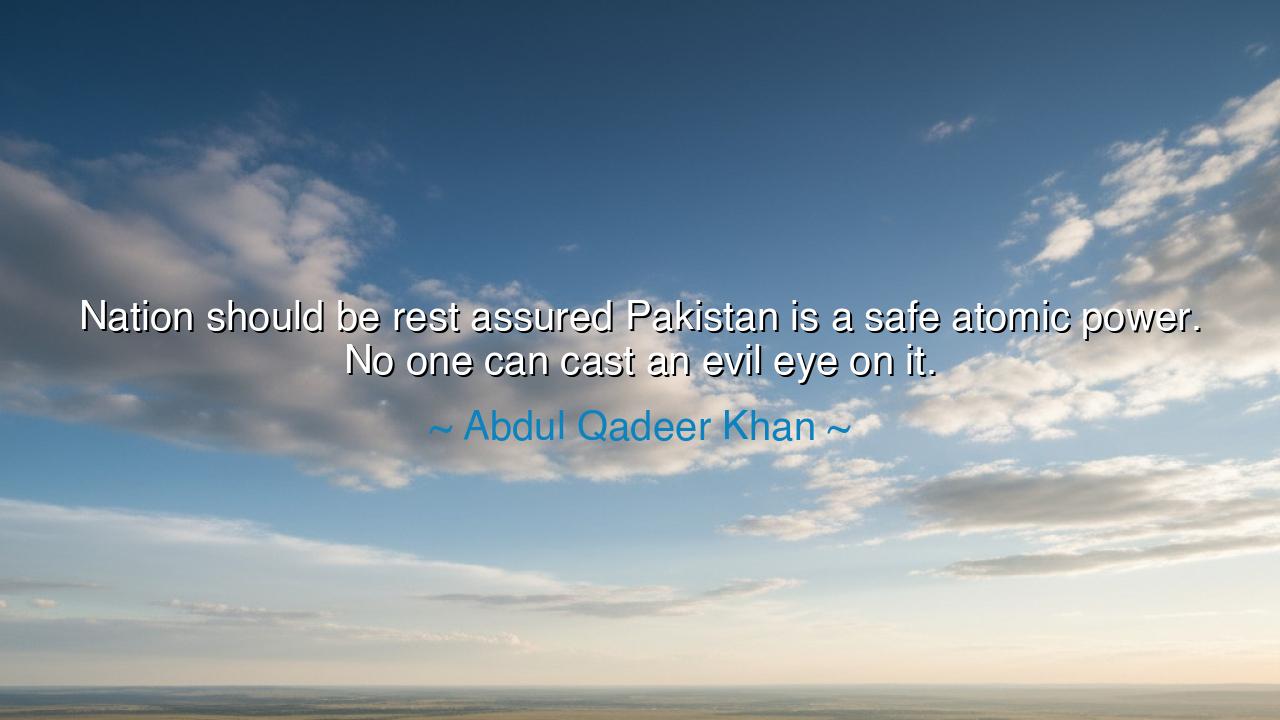
Nation should be rest assured Pakistan is a safe atomic power.
Nation should be rest assured Pakistan is a safe atomic power. No one can cast an evil eye on it.






“Nation should be rest assured Pakistan is a safe atomic power. No one can cast an evil eye on it.” These words from Abdul Qadeer Khan, a man often referred to as the father of Pakistan’s nuclear program, are steeped in a deep confidence and pride. Khan speaks not only of Pakistan's technological achievement in becoming a nuclear power but also of the sovereignty and security that this capability provides. In the ancient world, the possession of powerful weapons often marked the strength of a nation, not only in terms of military might but as a symbol of its independence and its ability to deter any would-be adversaries. Khan's declaration echoes the sentiments of rulers throughout history, who, in acquiring great power, sought to assure their people that their nation was untouchable, safeguarded by the might of their own forces.
The ancient Romans understood this well, especially during the reign of Augustus, who sought to consolidate Rome’s power by ensuring it was not only the mightiest empire in the world but also that no enemy could threaten its borders. Just as Rome built great walls, forts, and legions to protect its dominion, Khan saw nuclear weapons as the modern safeguard of Pakistan’s sovereignty. The creation of a powerful, indomitable force was not merely for the purpose of aggression but as a means to establish security and deter any potential threats, giving peace to the citizens of the nation.
Similarly, King Henry VIII of England understood the importance of securing his kingdom through the possession of powerful resources. Though not nuclear in nature, his creation of the Royal Navy was a demonstration of his need to protect his nation from external interference, particularly from rival powers like Spain and France. Henry VIII's military buildup, like Khan's nuclear ambitions, was driven by the need to preserve the independence and safety of his realm, ensuring that no foreign force could challenge his authority. Through these actions, both leaders sought not to provoke war but to secure lasting peace through strength.
However, Khan’s words also carry a deeper message — one of national pride. The acquisition of nuclear weapons by Pakistan was a pivotal moment in its history, a moment where a nation that had long struggled with political instability and insecurity on the world stage could stand tall among the great powers of the world. Just as India had developed its nuclear program, Pakistan sought to assert its right to be recognized as an equal player in the international arena, worthy of respect and protection. Khan's assertion of Pakistan's safety was not just about the atomic bomb, but about the dignity and sovereignty of the nation, ensuring that no external force could threaten its place in the world.
The strength of Pakistan’s nuclear program, as Khan suggests, lies in its invisibility and the mystique surrounding the capabilities of the nation. Just as ancient civilizations, such as Mesopotamia and Egypt, built awe-inspiring pyramids and ziggurats not just for religious purposes but to signal their greatness to the world, Khan’s creation of a nuclear Pakistan was a declaration that the nation had entered the modern world as a powerful force to be reckoned with. It was a statement that, like the great empires of the past, Pakistan could now safeguard its future with strength and resolve.
Ultimately, Khan's message is not just about military power, but about peace and security. In the grand tradition of nations throughout history, Pakistan sought to protect its people, not by threatening others, but by making it clear that it was capable of defending itself against all challenges. As ancient rulers knew, true power is not just the ability to conquer, but the ability to safeguard peace, ensuring that no evil eye dares to cast its shadow upon the land.






AMcan anh minh
This statement highlights the intersection of science, politics, and national identity. How does the public interpret assurances about atomic safety, especially in a country with historical tensions with its neighbors? Does emphasizing security address real concerns or merely serve symbolic purposes? I’m also curious about how international observers assess the credibility of such claims, and whether they factor into treaties, negotiations, and regional defense planning.
PVPhan vinh
I find myself questioning the long-term implications of declaring nuclear invulnerability. While it might solidify national unity and deter aggression, what mechanisms ensure that safety claims are factual and not merely political posturing? How does Pakistan maintain rigorous oversight, security protocols, and crisis preparedness to match such assurances? I’m also interested in exploring how statements like this influence global nuclear policy and regional security calculations.
TTNguyen Thi Thuy
This perspective makes me reflect on the psychological and political impact of nuclear capability claims. How do citizens interpret statements of invincibility—does it generate trust or fear? Does such a declaration effectively deter external threats, or could it create overconfidence within the nation’s own leadership? I’m curious whether other nuclear-armed states use similar rhetoric, and what lessons can be drawn about balancing power, perception, and diplomacy.
QBQuan Bui
I feel a tension between national pride and international concern in this quote. While it conveys strength and deterrence, it also makes me wonder about the responsibilities of a nuclear power to the global community. How does Pakistan address non-proliferation commitments and maintain safeguards against escalation? Could rhetoric emphasizing invulnerability inadvertently heighten regional tensions or provoke arms races, despite the intention of reassurance?
NPNguyet Phan
This statement raises important ethical and geopolitical questions. How does a nation ensure that its nuclear capabilities remain safe from accidents, sabotage, or misuse? Is the assurance aimed more at domestic audiences for morale, or does it serve as a warning to potential adversaries? I’m also curious about the balance between transparency and secrecy in nuclear programs—how much public knowledge strengthens confidence versus risks security breaches?